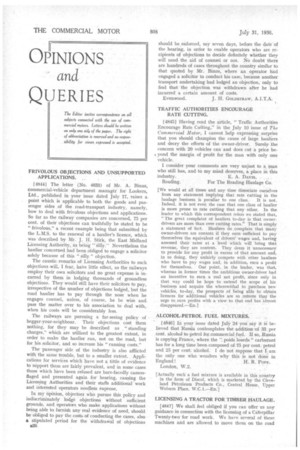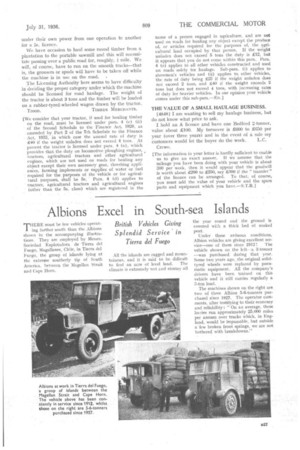OPINIONS and
Page 32

Page 33

If you've noticed an error in this article please click here to report it so we can fix it.
QUERIES
FRIVOLOUS OBJECTIONS AND UNSUPPORTED APPLICATIONS. .
[4844] The letter (No. 4833) of Mr. A. Binns, commercial-vehicle department manager for Lookers, Ltd., published in your issue dated July 1i, raises a point which is applicable to both the goods and passenger sides of the road-transport industry, namely, how to deal with frivolous objections and applications. So far as the railway companies are concerned, 75 per cent. of their objections can truthfully be stated to be "frivolous," a recent example being that submitted by the L.M.S. to the renewal of a haulier's licence, which was described by Mr. J. II. Stirk, the East Midland Licensing Authority, as being "silly." Nevertheless the haulier concerned had been obliged to engage a solicitor solely because of this " silly " objection.
The caustic remarks of Licensing Authorities to such objections will, I fear, haVe little effect, as the railways employ their own solicitors and no great expense is incurred by them in lodging thousands of groundless objections. They would still have their solicitors to pay, irrespective of the number of objections lodged, but the road haulier has to pay through the nose when he engages counsel, unless, of course, he be wise and. pass the matter over to his association to deal with, when his costs will be considerably less.
The railways are pursuing a far-seeing policy of beggar-your-neighbour. Their objections cost them nothing, for they may be described as ," standing charges," which are utilized to the greatest extent, in order to make the haulier run, not on the road, but for his solicitor, and so increase his "running costs."
The passenger side of the industry is also afflicted with the same trouble, but to a smaller extent. Applications for services which have not a tittle of evidence to support them are fairly prevalent, and in some cases those which have been refused are bare-facedly camouflaged and presented again for hearing, causing the Licensing Authorities and their staffs additional work and interested operators needless expense.
In my opinion, objectors who pursue this policy and indiscriminately lodge objections without sufficient grounds, and operators who make applications without being able to furnish any real evidence of need, should be obliged to pay the costs of conducting the cases, also a stipulated period for the withdrawal of objections
a26 should be enforced, say seven days, before the date of the hearing, in order to enable operators who are recipients of objections to decide definitely whether they will need the aid of counsel or not. No doubt there are hundreds of cases throughout the country similar to that quoted by Mr. Binns, where an operator had engaged a solicitor to conduct his case, because another transport undertaking had lodged an objection, only to find that the objection was withdrawn after he had incurred a certain amount of costs.
Evenwood. J. H. GoLns-ritAw, A.I.T,A.
TRAFFIC AUTHORITIES ENCOURAGE RATE CUTTING.
[4845] Having read the article, "Traffic Authorities Encourage Rate Cutting," in the July 10 issue of The Commercial Motor, I cannot help expressing surprise that you should champion the cause of large hauliers and decry the efforts of the owner-driver. Surely the concern with 20 vehicles can and does cut a price be* yortd the margin of profit for the man with only one vehicle.
I consider your comments are very unjust to a rnan who still has, and to my mind deserves,, a place in this
industry. E. A. DAVIS, ,
Reading. For The Reading Haulage Co.
j_We would at all 'times and any time dissociate ourselves from any statement implying that rate cutting in the
haulage business is peculiar to one class. It is not. Indeed, it is not even the case that one class of haulier is more prone to rate cutting that any other. In the leader to which this correspondent refers we stated that, "The great complaint of hauliers to-day is that ownerdrivers are more than ever cutting rates." That is simply a statement of fact. Hauliers do complain that many owner-drivers are content if they earn sufficient to pay themselves the equivalent of drivers' wages and, having assessed their rates at a level which will bring that revenue, they are content. They deem it unnecessary to provide for any profit in excess of that amount and, in so doing, they unfairly compete with other hauliers who have to pay wages and, in addition, earn a profit for themselves. Our point, in the leader, was that, whereas in former times the ambitious owner-driver had an incentive to earn a real net profit, since only in that way could he hope to extend the scope of his • business and acquire the wherewithal to purchase new vehicles, to-day, the prospects of being able to obtain licences for additional vehicles are so reinote that the • urge to earn profits with a view to that end has almost disappeared.—Eo.1
ALCOHOL-PETROL FUEL MIXTURES.
[4846] In your issue dated July 24 you say it is-believed that Russia contemplates the addition of 33 per cent, alcohol to petrol for commercial fuel. If so, Russia is copying France, where the " poids lourds " carburant has for a long time been composed of 75 per cent. petrol and 25 per cent. alcohol. I do not suppose that I am the only one who wonders why this is not chine in England! H. R. POPE. London, W.2.
[Actually such a fuel mixture is available in this country in the form of Disco!, which is marketed •by the Cleveland Petroleum Products Co., Central House, Upper Woburn Place, W.C.1.—En.]
LICENSING A TRACTOR FOR TIMBER HAULAGE.
[4847] •We shall feel obliged if you can offer us any guidance in connection with the licensing of a Caterpillar Twenty-two for road work. We have several of these machines and are allowed to move them on the road
under their own power from one operation to another for a 5s. licence.
We have occasion to haul some round timber from a plantation to the portable sawmill and this will necessitate passing over a public road for, roughly, I mile. We will, of course, have to run on the smooth tracks—that is, the grousers or spuds will have to be taken off while the machine is in use on the road. .
The Licensing Authority here seems to have difficulty in deciding the proper category under which the machine should be licensed for road haulage. The weight of the tractor is about 3 tons and the timber will be loaded, on a rubber-tyred-wheeled wagon drawn by the tractor„
• Troon. TIMBER MERCIIA NTS .
[We consider that your tractor, if used for hauling timber on the road, must be licensed under para. 4 (e) (ii) • of the Second Schedule to the Finance Act, 1920, as amended by Part 2 of the 7th Schedule to the Finance • Act, 1933, in which case the annual rate of duty is £40 if the weight unladen does not exceed 4 tons. At present the tractor is licensed under para. 4 (a), which provides that the duty on locomotive ploughing engines, tractors, agricultural tractors and other agricultural engines, which are not used on roads for hauling any object except their own necessary gear, threshing appliances, farming implements or supplies of water or fuel
• required for the purposes of the vehicle or for agricultural Purposes, shall be 5s, • Para. 4 (d) applies to
• tractors, agricultural tractors and agricultural engines (other than the 5s. class) which are registered in the
name of a person engaged in agriculture, and are not used on roads for hauling any object except the produce of, or articles required for the purposes of, theagricultural land occupied by that person. If the weight unladen does not exceed 5 tons the duty is £12, but it appears that you do not come within this para. Para. 4 (e) applies to all other vehicles constructed and used on roads solely for haulage. Sub-para. (1) applies to showmen's vehicles and (ii) applies to. other vehicles, the rate of duty being £25 if the weight unladen does not exceed 2 tons, and £40 if the weight exceeds 2 tons but does not exceed 4 tons, with increasing rates of duty for heavier vehicles. In our opinion your vehicle comes under this sub-pant.--En.) THE VALUE OF A SMALL HAULAGE BUSINESS. [4848] I am wanting to sell my haulage business, but do not know what price to ask.
I hold an A licence and have one Bedford 2-tonner, value about £100. My turnover is £600 to 2050 per year (over three years} and in the event of a sale my
customers would let the buyer do the work. L.C. Crewe.
[The information in your letter is hardly sufficient to enable us to give an exact answer. If we assume that the mileage you have been doing with your vehicle is about 300 per week, then it would appear that the goodwill is worth about £200 to £250, say £300 if the "transfer" of the licence can be arranged. To that; of course, you must add the value of your vehicle and the spare parts and equipment which you have.—S.T.R.1












































































